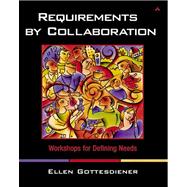Requirements by Collaboration: Workshops for Defining Needs focuses on the human side of software development--how well we work with our customers and teammates. Experience shows that the quality and degree of participation, communication, respect, and trust among all the stakeholders in a project can strongly influence its success or failure. Ellen Gottesdiener points out that such qualities are especially important when defining user requirements and she shows in this book exactly what to do about that fact.
Gottesdiener shows specifically how to plan and conduct requirements workshops. These carefully organized and facilitated meetings bring business managers, technical staff, customers, and users into a setting where, together, they can discover, evolve, validate, verify, and agree upon their product needs. Not only are their requirements more effectively defined through this collaboration, but the foundation is laid for good teamwork throughout the entire project.
Other books focus on how to build the product right. Requirements by Collaboration focuses instead on what must come first--the right product to build.








